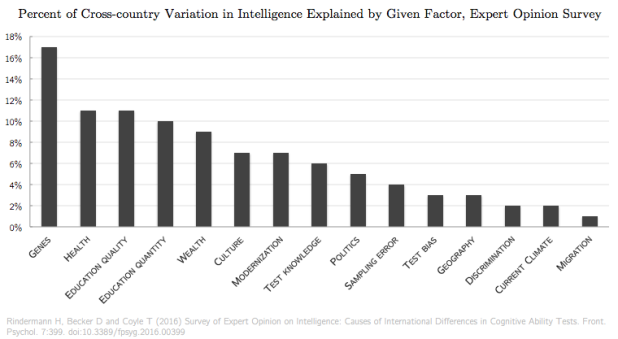Clear Above
The Right Stuff
March 22, 2016
In a survey of 71 experts on international differences in IQ recently published in Frontiers in Psychology, approximately 90% stated that genes were responsible for differing levels of cognitive ability between nations. This differs enormously from the popular narrative on group differences, which holds that genes are meaningless and play no part in human variation. In addition, experts believe that test bias plays only a small role, while discrimination has almost no effect on group differences.
IQ scores differ widely by country. At the top, East Asians have an average IQ of around 105, and Europeans have a slightly lower IQ around 100. Middle Easterners, Eskimos, and Hispanics have an average IQ around 85, while sub-Saharan Africans and Aborigines have IQ scores around 75. Some IQ differences are even larger; the average school student in Yemen, for example, has an IQ of 65, while the average Korean student has an IQ of 113. These group differences are the consequence of several factors, with evolutionary processes or genes playing a large role.
Given a sample of fifteen items, including choices such as culture, geography, genes, and test bias, intelligence experts stated that genes are the most important factor in causing group differences in ability. Although many in the media refuse to even acknowledge that nations vary in IQ, experts overwhelmingly accept this fact, and between 87% and 93% believe that genes are at least partially responsible. Quantity and quality of education were the next most important factors in explaining intelligence, and combined cause more group differences than just genes. Culture and health were also considered important.
In Western countries, education plays little role in IQ differences, because all children are educated to a high standard. However, education disparities are greater between countries. For example, a paper on African IQ (which they found to be 80) noted that:
Several items in [IQ] tests contain geometric shapes, which have no names in many African languages. It is not uncommon in (rural) Africa to come across test-takers who are unfamiliar with color-printed material, or who are inexperienced with using a pencil.
IQ researchers strongly believe that sampling error, test knowledge, and test bias were minimal, explaining just 11% of group differences. Contrary to the media’s perception of IQ tests as racist and bigoted, intelligence experts believe discrimination to be a trivial factor, accounting for just 2% of differences. In addition, discrimination explains almost none of the substantial IQ difference between White people and immigrants to the West from non-White countries. Likewise, climate, geography, and immigration are believed to cause no or almost no IQ differences.
The report also notes that among long-term ethnic groups in Europe, the least intelligent are Gypsies. Gypsies are descended from the Indian ‘untouchable’ caste and migrated to Europe centuries ago.
Intelligence, also known by the politically correct codeword cognitive ability, plays a major role in both group and individual success in life. Higher intelligence causes people—or at least correlates with what causes people—to earn more money, live longer and healthier lives, and have more social status. Higher intelligence also generally causes people to commit less crime and to be more honest. In fact, intelligence has effects in almost every area of life – smarter people, for example, are less likely to be murdered.
IQ research is itself subject to genetic variation, and like many other areas of life, top intelligence researchers are overwhelmingly White. Over 90% of researchers are from white countries. Interestingly, around 20% of IQ researchers have some Jewish ancestry. The full paper is available here (provisional copy, free for now).
 Daily Stormer The Most Censored Publication in History
Daily Stormer The Most Censored Publication in History



